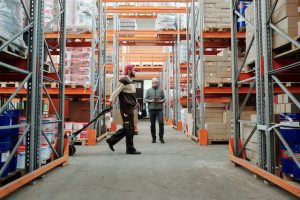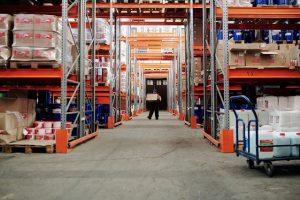Business managers in the U.K. are feeling the growing pains of post-Brexit logistics trends, connecting the political shift with supply chain disruptions, labour changes and financial burdens.
Are warehouse managers right to have these associations?
Explore Brexit’s impact on logistics and how the UK workforce adapts to opportunity instead of stagnation in light of recent tendencies.
What Are the Most Common Post-Brexit Logistics Trends?
Navigating logistics patterns after Brexit is necessary for industry workers to become stable in a new trading environment. How do the vote’s financial, legal, and labour ramifications appear several years into the decision?
1. Changes in Trade Regulations and Customs Procedures
There are three noticeable alterations under this umbrella:
- Increased customs complexity
- More complex tariffs and duties
- Changes to VAT and taxes

Brexit instituted new customs and border checks, increasing workloads and paperwork for staff. There is a longer list of clearance protocols and procedures that delay shipments and exacerbate waiting times. Administrative frustration compounds as inventory costs increase with extra tariffs and retraining nations to adhere to new compliance requirements.
Companies lose a competitive advantage if they do not invest this time and money. Operational costs are at an all-time high in the meantime, and inflated VAT and tax costs translate directly to customers, which harms logistics’ bottom lines. Prices will influence supply and demand in the U.K.
2. Supply Chain Disruption and Inventory Management

The implications of stricter regulations and heightened prices manifest in unstable supply chains. Inventories had irregular availability and diminishing trade relationships resulted in a change in product flow. Disruptions became the norm during the COVID-19 pandemic as logistics enterprises attempted to escape the pattern.
Limitations incite internal process discovery opportunities, such as reconsidering storage solutions for increased safety, inventory tracking and efficiency. Brexit deepened supply chain delays, making demand forecasting even more challenging.
Inconsistent shipments led to desperate and questionable decisions, such as dismissing health and safety reviews on food imports. The U.K. feared it would make prices skyrocket or cause it to lose out on products its citizens needed. Agility is necessary for supply chains to adapt while finding diverse, local suppliers to bolster buffer and safety stocks.
3. Altered Supplier Relationships
Supply chain disruptions and customs alterations trickle down until they impact international and intercorporate relationships. Supply chain diversity has never been more essential as the U.K. scrambles to onshore and reshore the connections it has. Freight costs are higher than ever, which is atypical for the U.K., so more freeports will arise to avoid heavy VAT and tax obligations.
Supplier relationships will also change because customers will become involved to alleviate duties from logistics transportation. For example, click-and-collect systems will reduce driver burdens and fuel use, saving money.
4. Working Through Labour Shortages

Immigration and labour directly correlate — there is a shortage in quantity and skill, primarily as workers leave due to the vote and fewer move to the U.K. The point-based immigration setup provides an exceptional barrier for many, where warehousing and logistics work would not qualify.
In 2020, there was already a shortage of 76,000 drivers, with numbers continuing to climb. The vacancies require supply chains to increase recruitment funding and in-house training to compensate for educational gaps and the mass exodus of potentially tenured staff.
This ideal leads many to include automation tools in their logistics operations, such as automated guided vehicles and AI-powered software, which come at a high price point but supplement staffing gaps. Logistics must consider how the single market supply chain impacts their ability to access advanced technologies from other nations.
How Should Businesses Adapt?

Supply chains have noticed a few ways to improve after Brexit’s impact on logistics. It is time to evaluate warehousing solutions and negotiate contracts with closer suppliers, but how else can the U.K. capitalise on this contentious situation?
The networking opportunities are the most prominent. New partnerships will form with U.K. companies that have always looked outside its borders and enterprises will develop a more involved community of logistics workers with common motivations. Additionally, the collaboration encourages conversations for progress and innovation for trading opportunities, customs improvements, and warehouse expansion to the EU mainland.
These benefits promote operational flexibility. Post-Brexit logistics trends caused an unprecedented transition, which made risk management and resilience techniques more comprehensive. The desire to respond gracefully to more politically driven changes prevents corporations from stagnating because they will continuously develop.
The excess paperwork and administrative hoops caused by customs and related procedures will inspire digital transformation. Streamlining encumbering processes is required for the nation to recover its lost GDP or countries will no longer be incentivised to make the effort. The obstacles make data transference expensive and time-consuming, which must be improved to meet modern delivery expectations. Warehouse management systems, big data analytics, and the Internet of Things are several considerations for automating processes and promoting scalability.
How Logistics Has Changed in Light of Brexit
Supply chains do not have time to lament Brexit’s impact on logistics — they must make the most of the situation by changing priorities and strategizing. Reframing could yield enormous benefits, such as expedited digitisation and emboldened economies. Although the collaborative efforts seem insular currently, it is impossible to tell what the future holds for trade post-Brexit.
Author Profile

- Blogger by Passion | Contributor to many Business Blogs in the United Kingdom | Fascinated to Write Blogs in Business & Startup Niches
Latest entries
 BusinessApril 11, 2025How Hiring a Student Could Be the Best Move Your Business Makes
BusinessApril 11, 2025How Hiring a Student Could Be the Best Move Your Business Makes Living in LondonApril 9, 20255 Key Considerations for Long-Term Urban Rentals
Living in LondonApril 9, 20255 Key Considerations for Long-Term Urban Rentals EntertainmentApril 3, 20257 Slot Games that are Popular with Londoners
EntertainmentApril 3, 20257 Slot Games that are Popular with Londoners EventsMarch 25, 2025EGR Awards 2025: London’s Comeback After Losing ICE
EventsMarch 25, 2025EGR Awards 2025: London’s Comeback After Losing ICE




